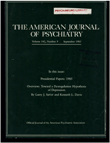Diagnosing schizophrenia in 1980: a survey of U.S. psychiatrists
Abstract
The authors mailed 1,227 questionnaires to U.S. psychiatrists at the time of the introduction of DSM-III to ascertain their diagnostic approach to schizophrenia; 25% (N = 301) of the questionnaires were returned. Only 4 symptom categories reached a 50% accordance level, and there was little agreement on combinations of signs or symptoms, including that recommended by DSM-III. A cluster analysis showed some overall patterns: younger respondents and those from the Pacific coast tended to diagnose more closely to DSM-III; older respondents gave more individualistic responses. The authors express concern that research separating schizophrenia from other disorders that are far more effectively treated has not had a substantial effect on the diagnostic practices of U.S. psychiatrists.
Access content
To read the fulltext, please use one of the options below to sign in or purchase access.- Personal login
- Institutional Login
- Sign in via OpenAthens
- Register for access
-
Please login/register if you wish to pair your device and check access availability.
Not a subscriber?
PsychiatryOnline subscription options offer access to the DSM-5 library, books, journals, CME, and patient resources. This all-in-one virtual library provides psychiatrists and mental health professionals with key resources for diagnosis, treatment, research, and professional development.
Need more help? PsychiatryOnline Customer Service may be reached by emailing [email protected] or by calling 800-368-5777 (in the U.S.) or 703-907-7322 (outside the U.S.).



